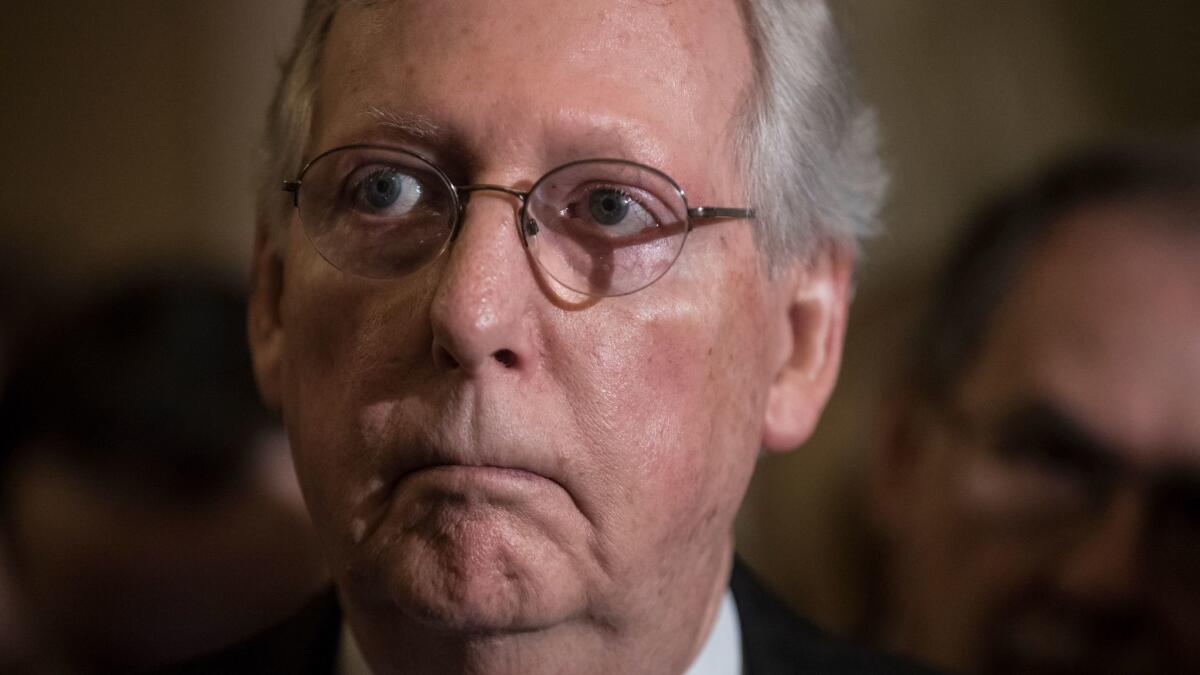By inserting Obamacare repeal into tax plan, Senate GOP may complicate passage

Reporting from Washington â Senate Republicans took a big gamble Tuesday with their tax reform bill, adding a partial Obamacare repeal provision that would free up more money for tax cuts, but also inject significant new political hurdles.
The change, backed by President Trump and a handful of senators, would end the mandate under the Affordable Care Act that all Americans have health coverage. Senate GOP leaders had previously rejected the idea as too risky to include in their tax package, particularly after the repeated failed efforts earlier this year to repeal and replace the 2010 law.
Repealing the mandate would save the government an estimated $338 billion over 10 years, but only because millions of people would stop buying insurance and therefore would no longer receive subsidies to help pay for their premiums.
Looking for a way to fund their ambitious tax plan and under fire for giving most of the breaks to corporations and the wealthy, Senate Republicans made a last-minute decision to insert the Obamacare repeal. They plan to use the savings to pay for additional tax cuts for middle- and upper-class Americans.
âItâll be distributed in the form of middle-income tax relief,â said Sen. John Thune of South Dakota, the third-ranking Republican.
It remains to be seen whether Senate leaders can muster the 50 votes needed from their own party to pass the new version, though they expressed confidence. âWeâre optimistic that inserting the individual mandate repeal would be helpful,â Senate Majority Leader Mitch McConnell (R-Ky.) said.
As a possible concession to lure centrist Republicans who sank previous efforts to repeal the healthcare law, Senate leaders indicated they would move ahead with a bipartisan healthcare compromise bill worked out by Sens. Lamar Alexander (R-Tenn.) and Patty Murray (D-Wash.) that is intended to stabilize the healthcare markets. âWeâre committed to moving Alexander-Murray,â Thune said.
But by inserting healthcare into the tax debate, Republicans risked reactivating opposition from the coalition of healthcare groups that helped quash their earlier repeal efforts.
On Tuesday, 16 leading consumer and patient groups together expressed alarm at the proposal. âRepealing the individual mandate without otherwise increasing access to adequate, affordable health insurance is a step backwards for individuals and families,â noted the groups, which include the American Heart Assn., the American Lung Assn., the March of Dimes, Consumers Union and the advocacy arm of the American Cancer Society.
Democrats called it a desperate move that would result in 13 million additional uninsured Americans and premium hikes of 10%, according to nonpartisan analyses of the impact of ending the mandate.
âRepublicans just canât help themselves,â said Senate Minority Leader Charles E. Schumer (D-N.Y.). âIf the American people werenât already outraged by this [tax] bill, injecting healthcare into it will certainly do the trick.â
The House tax bill, which is expected to pass later this week, does not include the Obamacare provision, though ending the mandate is popular among House Republicans. Conservatives pushed to add it to House legislation.
âAdding the repeal of the individual mandate to tax reform could be the most consequential step this Congress takes to date in fulfilling our promises to the American people,â said the Republican Study Committee. âIt appears the Senate is keeping its promises. The House should do the same.â
Senate Republicans have been frantically searching for ways to make their bill more attractive to middle-class taxpayers, while still adding no more to the federal deficit than the $1.5 trillion allowed under their budget instructions.
The tax billâs main component is a cut in the corporate rate from 35% to 20%. It lowers tax rates for many individuals, but also does away with popular deductions, such as the ability to write off state income and property taxes, widely used in California and other high-tax states.
House Republicans ended up retaining property tax deductions up to $10,000 after lawmakers from New York and New Jersey objected.
Some key GOP senators also voiced concerns that their plan did not do enough to help the middle class. âMiddle-income taxpayers are going to be really hurt by repeal of the SALT,â said Sen. Susan Collins (R-Maine), using the acronym for state and local tax deductions.
The idea to insert the Obamacare mandate repeal is intended as a compromise. Republican senators have argued it makes sense to include it in tax policy because the mandate was upheld by the Supreme Court in 2012 by declaring it a tax. Sens. Tom Cotton (R-Ark.) and Rand Paul (R-Ky.) were among those who had spoken with Trump about including it.
The savings could be used to push down rates. Trump, on Twitter on Monday, suggested using it to lower the top tax rate for the richest Americans from 38.5% in the Senate bill to 35%, and then using âthe restâ for middle-income families.
âIt makes too much sense,â said Sen. John Kennedy (R-La.). âYou could use it to give relief to those middle- and upper middle-class taxpayers who are not getting as much relief as they should because of [the elimination of the state and local tax] deduction.â
But while most Republicans support getting rid of the Affordable Care Act individual mandate and have campaigned on the issue for years, inserting it now could backfire. Some, including Collins, are concerned that repeal would cause too much disruption in health insurance markets.
A somewhat similar idea, the so-called skinny Obamacare repeal, failed to garner enough Republican support in the Senate in July when Collins joined GOP Sens. John McCain of Arizona and Lisa Murkowski of Alaska to vote no.
Independent analyses by the Congressional Budget Office and others suggest that without some kind of penalty, many healthy Americans would not get insurance until they were sick. That would push up health insurance costs, causing what people in the business call a âdeath spiral.â
Several states experienced just this kind of market collapse when they tried guaranteeing their residents coverage without any kind of requirement that all people â including the young and healthy â get coverage.
Schumer indicated Tuesday that Democrats may try to peel off GOP support for the tax bill by withholding their votes on the Alexander-Murray bipartisan measure, a key part of winning over Republican moderates.
While Senate passage of the tax bill can be done on a strictly partisan vote under special budget rules, Democratic votes would be needed to approve the Affordable Care Act fix.
âWe should pass the Alexander-Murray compromise,â Schumer said. âWe donât need to trade it for a tax bill and we wonât.â
Times staff writer Noam N. Levey contributed to this report.
ALSO
Is this small-town congressman from New Mexico tough enough to win Democrats the House majority?
More coverage of politics and the White House
More to Read
Get the L.A. Times Politics newsletter
Deeply reported insights into legislation, politics and policy from Sacramento, Washington and beyond. In your inbox three times per week.
You may occasionally receive promotional content from the Los Angeles Times.












